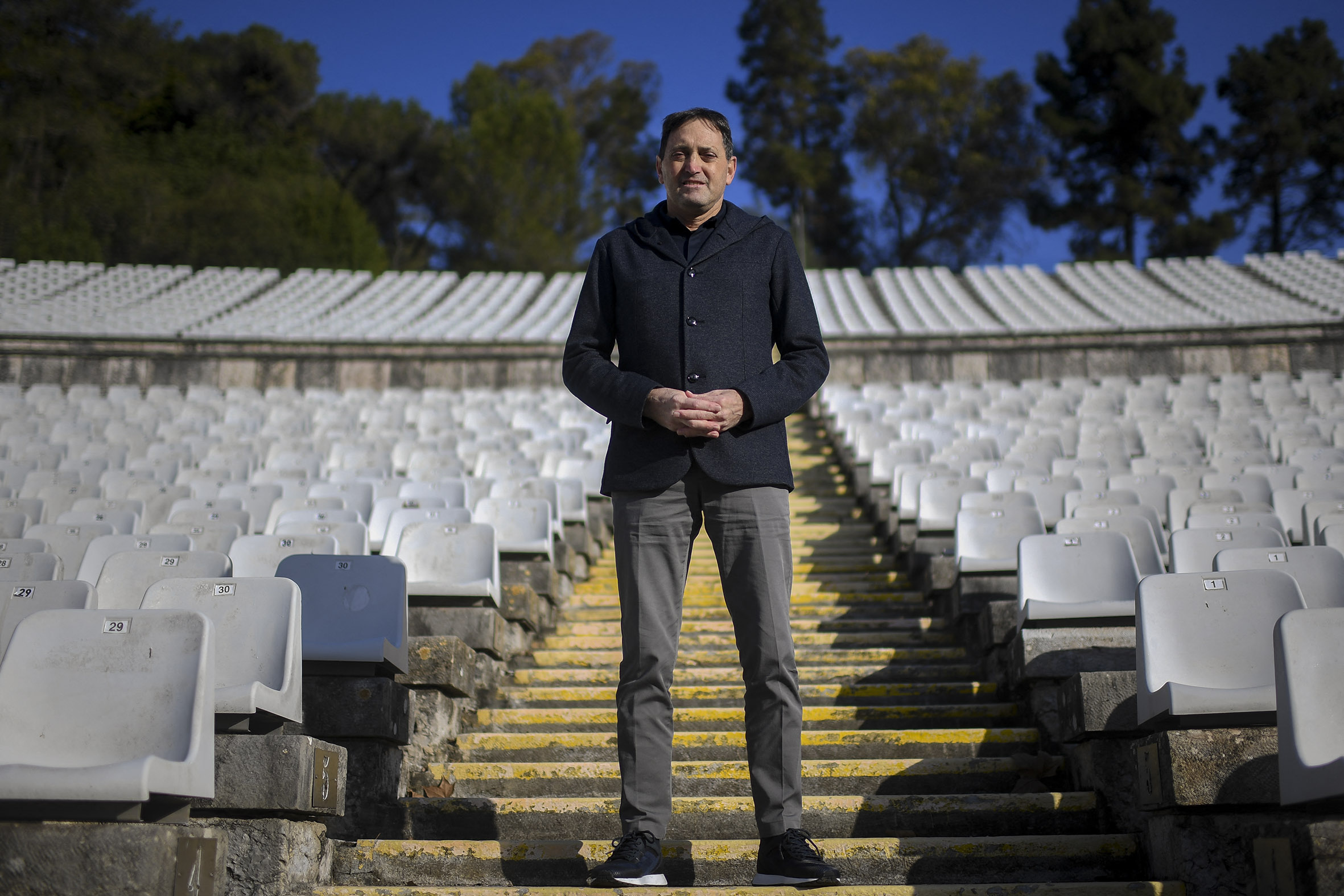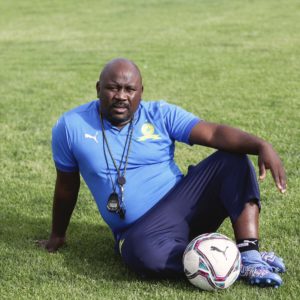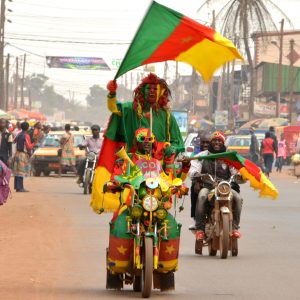A steadier hand steers Cameroon’s resurgence
The past decade has been topsy-turvy for Cameroonian football, but the Indomitable Lions can return to the top of African football now that their manager shuffle seems to have ended.
Author:
12 January 2022

“What do you want to be remembered for?” a reporter asked António Conceição when he was unveiled as Cameroon’s national football team coach in 2019. Leaning forward, with his gaze oozing a blend of serenity and seriousness, he replied in Portuguese: “Winning the Africa Cup of Nations (Afcon) and qualifying Cameroon for the World Cup.”
The appointment of the former FC Porto defender had been a great surprise. He was chosen to lead the five-time African champions on a two-year deal ahead of a group of more flamboyant tacticians. A journeyman who had coached 14 teams in 16 years, Conceição’s marriage to Cameroon was a mismatch, but it is a union that could be vital in catapulting the Central African nation back to the summit of African football.
Cameroon was in varying shades of disarray when Conceição entered the scene. He replaced Clarence Seedorf, a hitherto mercurial midfielder who had dazzled for Real Madrid and both AC and Inter Milan. With Patrick Kluivert, another venerated former football star, serving as Seedorf’s deputy, the Dutch duo were supposed to form a blockbuster pair. But a disappointing spell 11 months into their contract, capped by a round 16 exit at the 2019 Afcon in Egypt, saw both men axed in July that year.
That was Cameroon football’s jet-propelled revolving door with managers at work. Seedorf was the eighth manager to lead the Indomitable Lions since 2010. “You don’t get results if you keep changing your managers all the time,” said striker Patrick Suffo, who was part of Cameroon’s Olympic gold-winning team in 2000.

Cameroon went from being the first African team to reach the quarterfinals of the Fifa World Cup in 1990 – which was followed with African dominance – to not even qualifying for the Afcon in 2012 and 2013.
There have been signs of a revival under Conceição, even though he started on a bad note. His less than impressive CV and speaking Portuguese in his unveiling instead of the French and English widely spoken in Cameroon didn’t win him many supporters.
But time and results have changed the perceptions and inspired confidence in Conceição, who unleashed a high-octane football, tasking his wingbacks to attack and defend in equal measure. The 60-year-old tried several formations, moving from a 3-5-2 to a 4-3-3 and a 4-4-2. He encouraged his team to build play from the back, but also to excel on fast breaks in a philosophy that’s geared towards controlling the encounter from kickoff.
“If a coach tweaks his style this often, it means he is looking for something specific, but it also intimates that he has the quality of players he needs to play these different roles,” said Cameroon skipper Vincent Aboubakar. “It is also good that we can adapt to these systems, because it means we can easily switch to a different tactical setup against an opponent. It provides different options.”
A team player
Conceição loves variety, but he also promotes competition within his side. In the past 12 months he has called up 52 players, including an incredible eight goalkeepers, with a mantra all too familiar to them: “Perform or lose your spot.”
“The competition in this team is incredible, but it is good because it helps us to get better,” said Cameroonian left back Ambroise Oyongo, who was a member of the Afcon-winning team in 2017. “If you go into a game knowing that there’s someone on the bench waiting to take your spot if you disappoint, you tend to focus and do the right things.”
Cameroon’s strength lies in their midfield, which is filled with technically gifted and strong players. Napoli’s Zambo Anguissa does the dirty work, coordinating play, sprinting from one box to the other and shielding the defence while supporting the attack. An innovative midfielder who had scored only two goals for the Indomitable Lions, the former Fulham midfielder has upped his tally to five, netting three under Conceição.
Related article:
The Cameroon coach is strict with his ideas, but he also provides room for his players’ individual brilliance. “He’s very close to the players,” a member of Cameroon’s technical team said, mentioning that Conceição dances and sings with his players during pre-match warm-ups and trips to the plane.
“He talks with the players very often,” midfielder Samuel Oum Gouet said. “He’s all about knowing what’s going on in your mind, or how you feel about a particular play or role within the team. It’s a dialogue, but the sort of dialogue that helps you grow as a person, and you see within the group everyone is motivated to perform.”
The Indomitable Lions have rediscovered their goalscoring mojo under Conceição. Followers of the team are delighted by this turnaround as it reminds them of the early 2000s when Cameroon’s attacking armada scored for fun. This, they believe, is foretelling of impending greatness on home soil.
From two stadiums to 30
Half a century after Cameroon’s first and only organisation of the Afcon in 1972, the country is once again hosting the continent’s most mercurial players and Africa’s most passionate football fans at the 33rd edition of the showpiece. It had initially clinched rights to host the then 16-team tournament in 2019, but an increase to 24 teams coupled with delayed work on certain infrastructure had seen it stripped of that edition and tasked to host the 2021 tournament, which was delayed by Covid-19.
The country has pumped enormous finances into erecting more than 30 stadiums. Abel Mbengue, communications director of the local organising committee, is in a better position than most to talk about the meaning of the return of the Afcon to Cameroon. In 1972, he witnessed the eight-team Afcon from the vantage point of a commentary booth at the Ahmadou Ahidjo Stadium in Yaoundé as head of sport at Cameroon’s national radio service.
“It is an emotional thing to have been there 50 years ago to see the 1972 Afcon and still [be] alive to witness this one,” said Mbengue, now 80. “In 1972, football was a refuge for regional solidarity and people trooped into the stadiums out of curiosity. Back then we had just two major stadiums in Cameroon, one in Douala and another in Yaoundé.”

“Now things are different. Football is more diversified and it’s become more professional, and to see just the incredible transformation that has taken place is incredible.”
Covid-19 and security concerns owing to the Anglophone crisis have cast a shadow on the tournament. Separatist movements in both the northwest and southwest regions – the latter home to the cities of Buea and Limbe where Tunisia, Mali, Mauritania and Gambia will compete – have been embroiled in a war with the central French-speaking state. Nevertheless, ace sportscaster Geoff Ngwa expects a memorable tournament.
“It will be a cracking football tournament because Cameroonians love football. They’re welcoming and I genuinely think now we have a truly wonderful crop of world stars,” Ngwa said. “If you look at Egypt, they have Mohammed Salah, Senegal has [Sadio] Mané and Edouard Mendy, Algeria has [Riyad] Mahrez and you just have all these other collectively good teams.”
A great start
But for the main protagonists, the Indomitable Lions of Cameroon, playing at home is a perfect setting for them to bring back the glory days. Cameroon started their tournament with a 2-1 win over Burkina Faso on 9 January. They will take on Ethiopia on 13 January before concluding the group stage with an anticipated clash with Cape Verde four days later.
Of the 28 players in the competition, only seven were part of the 2017 tournament, but there’s a shared drive to re-enact the feats of five years ago.
“A few years ago, if anyone told me I was going to be playing at the Afcon and at home in front of my family and friends, I wouldn’t have believed them,” Lens forward Ignatius Ganago said. “We want to keep the Cup of Nations at home because we know what this will mean for the fans and how happy they will be.”
Related article:
Oyongo Bitolo, an Afcon victor in 2017, believes the investment made for the showpiece will have a lasting legacy on Cameroonian football.
“When I played for Cotonsport de Garoua, we didn’t have all these wonderful stadiums and people didn’t look at football as a big deal. Now we have the amenities, and if we win we’ll be inspiring thousands of young boys and girls to take up the sport. This will help our clubs and the game will grow more than before.”
While the excitement hits fever pitch in Cameroon, superstitious fans believe the election of four-time African Player of the Year and two-time Afcon winner Samuel Eto’o at the helm of the country’s football federation could just be the good luck charm it needs to return to an epoch wherein the Indomitable Lions were among the globe’s most feared football teams. If they can do that, they would achieve what Conceição hopes to be remembered for.


